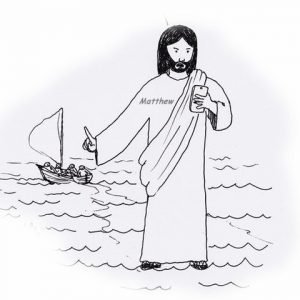Matthew 7.15-20

Matthew included in his record of Jesus’ teaching to a crowd, known as the Sermon on the Mount, a way of distinguishing between a false and true prophet. Matthew 7.15-20 It wasn’t by the strident nature of their voice, their popularity, their capacity to evoke emotion, the clothes they wore, the people who back them, the wealth they have, the family they belong to, the number of followers on social media or the academic qualifications they hold. It was by the fruits of their life. This would include their character and what they do.
He warned them then about false prophets and the warning is relevant today. False prophets were a common feature of life in the time leading up to Jesus and they didn’t go away either during Jesus’ ministry or during the time of the early church. Warnings against false prophets are found during the entire biblical period. They arose apart from the church and even more dangerously within the church. Peter gives a general warning with, ‘But false prophets also arose among the people, just as there will be false teachers among you, who will secretly bring in destructive heresies, even denying the Master who bought them, bringing upon themselves swift destruction. 2 Peter 2.1 Jesus took very seriously the threat to the church arising from false prophets, he called them ravenous wolves in sheep’s clothing. The reference to sheep’s clothing is not primarily an allusion to vulnerability and innocence. The sheep are the people who hear Jesus voice as their shepherd and follow him. Jesus is warning that false prophets will come from within his people and their motivation is to lead God’s people astray. The principal means of doing this is to prevent them from hearing the Shepherd’s voice.
This then calls for great discernment on the part of the sheep or God’s people. One can tell a true and false prophet by their lives and what they seek to do. As Jesus says, ‘Every healthy tree bears good fruit.’ Mathew 7.17 Conversely, ‘the diseased tree bears bad fruit.’ False prophets will lead people away from Jesus. We are not talking here about disagreements within the church over minor matters. No human can know all things. Neither are we talking about living a perfect life as no human outside of Jesus can do that. But all prophets, teachers, evangelists, elders should be continually on the path of sanctification. The word of God should be active in their lives changing them progressively into the likeness of Jesus.
Jesus’ prime concern in Matthew 7 was to lay down a warning about those “prophets” who would divert them from grasping who he was. His advice is as relevant and pertinent now as then. Check their lives out and don’t be taken in by appearances or as Jesus put it, ‘Thus you will recognise them by their fruits.’ Matthew 7.20
How much care do you take to discern the difference between false and true prophets?
Robin Mark – Days of Elijah (Official Lyric Video)
